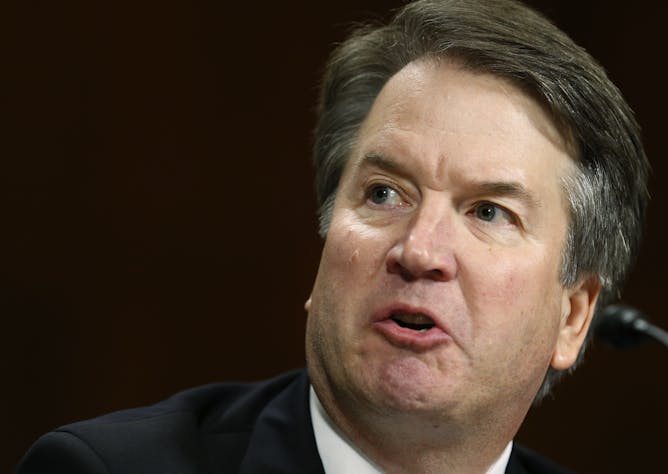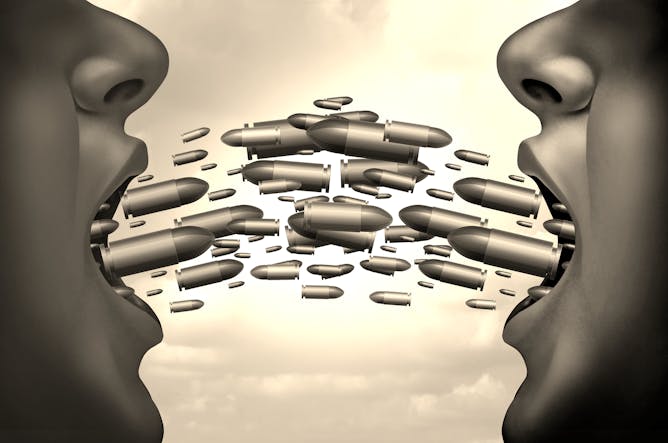Editor's note
|
|
Brett Kavanaugh isn’t the first controversial Supreme Court appointee supporters have tried to ram through the confirmation process. Historian Calvin Schermerhorn of Arizona State University writes that there have been other bitterly contested nominations in American history, including political careerists confirmed with scant vetting. Decisions handed down by several of those jurists had profound – sometimes destructive –
effects on the lives of Americans.
President Trump has declared war on the news media, calling it the “enemy of the American people.” But as rhetoricians Kyle Jensen and Jack Seltzer argue, the press isn’t exactly an innocent victim. They point to the work of the late rhetorical theorist Kenneth Burke, who was able to show the ways news outlets promote and exacerbate political warfare through seemingly innocuous features of articles, like how the headlines
are worded.
Bitcoin and other digital currencies have been on a wild ride in recent years. After soaring in 2017, their value has plunged for much of 2018. Part of the problem is they have a dark side that has attracted the interest of criminals and scrutiny of regulators. We collected a few articles from our archive to shine light on digital currencies’ potential and problems.
|
Naomi Schalit
Senior Editor, Politics + Society
|

|
|
Top stories
|

Supreme Court nominee Brett Kavanaugh at the Senate Judiciary Committee hearing, Sept. 27, 2018.
AP/pool image, Michael Reynolds
Calvin Schermerhorn, Arizona State University
Contentious or politically driven Supreme Court nominations are not new. But US history shows that many of those contested nominees who were confirmed would go on to author controversial opinions.
|

The quiet consumption of news can sustain a polarized political environment.
Lightspring
Kyle Jensen, University of North Texas; Jack Selzer, Pennsylvania State University
In Kenneth Burke's 'The War of Words,' the late rhetorical theorist picks apart the little ways news articles can subtly influence readers – and harden divisions.
|

Cryptocurrencies even have their own investment companies.
Reuters/Simon Walker
Bryan Keogh, The Conversation; Jeff Inglis, The Conversation; Nicole Zelniker, The Conversation
Bitcoin and other digital currencies have been running wild in recent years, soaring and then plunging in value. A few stories from The Conversation's archive offer a glimpse into their world.
|
|
|
Science + Technology
|
-
Joel Wooten, University of South Carolina
It has been 10 years since Elon Musk's SpaceX launched the commercial space age. What hurdles must be overcome before private companies begin exploring, colonizing and mining other planets?
-
William Ross, University of Richmond
A famous mathematician claims to have cracked a longstanding problem involving prime numbers. But his results still need to be verified.
|
|
|
|
Ethics + Religion
|
-
Francisco Javier López Frías, Pennsylvania State University; Cesar R. Torres, The College at Brockport, State University of New York
Football plays an important role in American culture. Experts point out some ethical questions you might consider asking this season.
|
|
|
|
|
|
From our international editions
|
-
Crispin Halsall, Lancaster University
PCBs were phased out three decades ago. But they're still lingering in the ocean.
-
John Long, Flinders University
Travel from Perth to Melbourne and every kilometre you go represents 100 million years of life on Earth. So let's take a ride, on a motorcycle of course.
-
Christopher Tounsel, Pennsylvania State University
Today in South Sudan's political climate, footballing success may wield more symbolic importance than anything else.
|
|
Today’s chart
|
-

 |
Patrick Rooney
Indiana University-Purdue University Indianapolis
|
| |
| |
| |
|
|